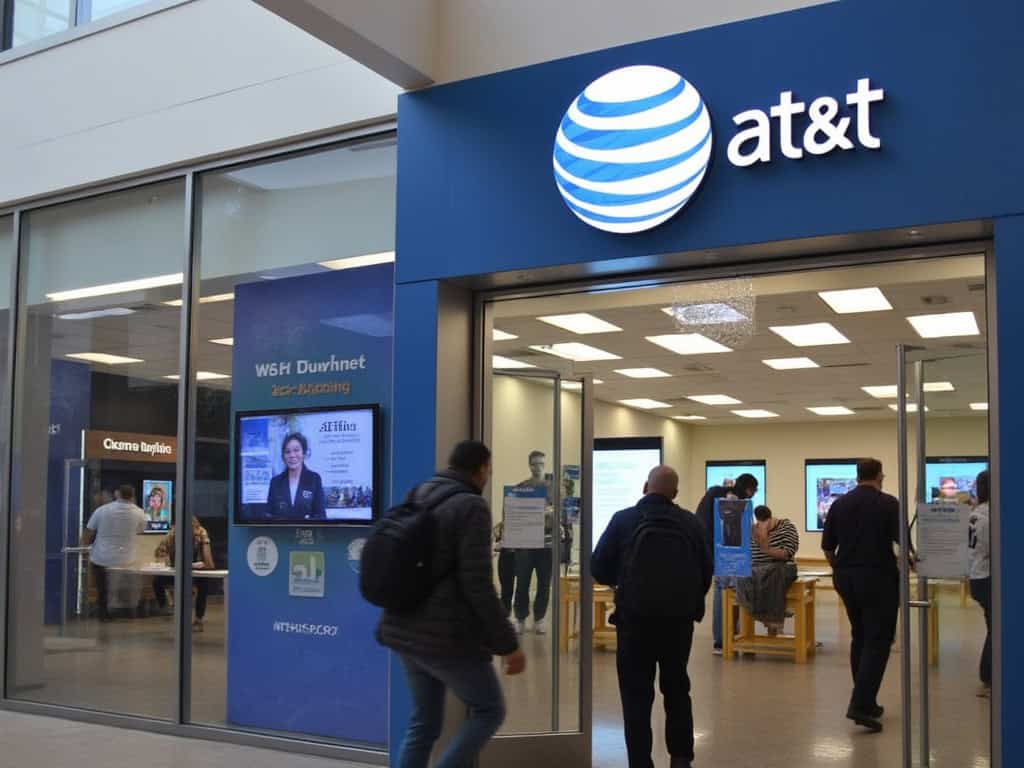The Great AT&T Dallas Relocation: A Corporate Odyssey

In this large, sprawling universe of corporate America, with companies like planets orbiting the sun of profit, AT&T has decided to embark on a journey that would make the most seasoned space traveler scratch their head. Here's the scoop, straight from the cosmos of corporate strategy.
From technology innovation perspective, AT&T is working with AST SpaceMobile for satellite internet, to compete with Starlink. A short discussion below.
The Dallas Directive
AT&T, in what can only be likened to a corporate version of "The Hunger Games," has issued a decree: Move to Dallas, TX, or prepare to be out of the game—not entirely out, mind you, but definitely not in the loop. In fact, this giant of telecommunications is not touting Dallas for reasons of centralization alone; it's more on the lines of making the city the new Silicon Valley—one for the telecom sector.
Why Dallas?
Because it seems that if you are not in Dallas, you are not really in AT&T anymore, it is a lot like the company's version of "If you build it, they will come," with a little more corporate push and a lot less ghostly baseball.
The Mysterious Migration of Management
The Corporate Chess Game: Hypocrisy Hyperspace - Part of what feels more like corporate chess strategy than any ordinary business decision, AT&T recently declared Dallas as its new hub. Employees are being asked to pack their bags and head toward the city, but here comes the interesting part—the higher-ups, perhaps including even the chief executive officer, may not be moving themselves. It's almost as if they're saying, "Move to Dallas, but we'll just Zoom in from our yacht in the Bahamas.".
The Management's Mysterious Migration
While they're telling everyone else to head to Dallas, corporate types appear to be playing a corporate version of "Where in the World is Carmen Sandiego?" with their own offices. They aren't necessarily housed inside AT&T locations, which raises the question: Are they plotting from a secret volcano lair, or do they just like the coffee better at a competitor's office?
The Relocation Ruse That could all form part of a grand strategy to centralize operations and cut costs—or maybe, just maybe, someone at the top really, really likes Dallas BBQ.
But here's the rub: if you're not making a move to Dallas, then you might start to wonder if your manager is actually in a real office or whether that's just a very convincing Zoom background.
AT&T Sentiment on X
Economic Shifts
There has been a lot of buzz about Texas being the new land of opportunity, what with lower taxes and a more friendly business environment. However, some have qualms due to a host of reasons; this includes political climates and economic shifts.
The Corporate Exodus
Posts on X come in two tones mainly: that sinking feeling of excitement mixed with dread. Others take it positively—additional boost in the career sense, thrusting one in the center of it all. Others felt it was some corporate chess move in which they were only pawns, tossed about with little say in the matter.
AT&T Brain Drain, Outage & Data Leaks
The Game
- Outrage Outage: They have had outages, but their response? A master passcode reset. That is to say, "Oops, your data's out there, but here's a new password; problem solved!"
- Data Leak Denial: Every time the data has leaked, it has been, "We're investigating." It's like a slow-motion detective show where the detective happens to be the suspect.
The Parade of Public Relations.
- Outage Credit: You're going to give me a credit of $5 for an hour-long outage? That's like offering a Band-Aid when someone just got run over by a bus.
- The Dark Web Drama: There are 73 million records this time, and they say things like, "We're not sure it's ours," but we're investigating that. How does one admit having a problem and yet really not own it?
Exodus of Employees
- Quality Quagmire: With knowledgeable people having left, what is now remaining might resemble the crew of the Heart of Gold in The Hitchhiker's Guide to the Galaxy—without the improbable drive.
- The Dallas Dilemma: Depending on whom one speaks to, moving to Dallas might be viewed as a career opportunity or a forced relocation. It's like being told to move to the Death Star without the cool laser.
In summary, AT&T's management seems to be:
- Playing Chess with Employees: Moving pieces around (to Dallas) while the king (management) remains elusive.
- Reacting Rather Than Proacting: When issues arise, they're more about damage control than prevention.
- The PR Spin: Offering minimal compensation for major inconveniences, which might not soothe the masses but certainly keeps the PR department busy.
From an outside perspective, it's like watching a corporate version of "The Office," where the camera crew is replaced by X posts, and every episode ends with, "We're looking into it."
The Surplus Saga Continues
In what would only be termed a sequel to "The Great Dallas Migration," AT&T decided the plot twist was not just about moving to Dallas but about moving out of the USA altogether. That is right—they are planning a 25% surplus/layoff from October 2024 through January 2025. It's almost as if they say, "You thought moving to Dallas was hard? Try moving to Slovakia or India!"
The Global Shuffle
Squeeze out resources in the USA and replace them with talent from Slovakia and India. Again, AT&T seems to be playing corporate chess, where pawns are people and the board is the face of the earth.
Sentiment on X
There's all this talk about cost efficiencies, and then there's a counter-narrative where companies are reassessing this move for various reasons: political climates weigh alongside economic shifts. AT&T, however, is doubling down.
Reactions on X are a mix of excitement and dread. Some see this as an opportunity for foreign experience, while others view it against the backdrop of corporate chess moves in which they themselves have simply been pawns moved around without a say.

The Financial Angle
Financial Health
On the revenue and profit front, AT&T has been on a roller-coaster ride. There have been dips in its revenue, driven by various factors such as competition inside the telecom space, while the company also wrestles to pivot toward the media business lines and streaming services.
Performance of Stock
Ups and downs have been there. Investors have seen resilient quarters accompanied by others reflecting the broader market's skepticism toward classic telecom companies in the era of streaming and tech.
Investor Sentiment
Cost-Cutting Moves
Every step, from the push to Dallas to layoffs and the international relocation strategy, has been directed at cost-cutting. Generally, investors do like cost efficiencies, but again, there is a balance. Too much cost-cutting can convey distress or lack of innovation.
Positive Spin
The other view, of course, is that some investors would find these moves necessary for the survival of AT&T in such a competitive environment as posed by tech giants Amazon and Netflix when competing in the telecom and media space.
Skepticism
Some are still cynics who question if this is indicative of deeper problems or if AT&T only wants to become leaner in order to keep up with the changing times.
Diversification
AT&T's venture into media, like WarnerMedia, was viewed as a move toward diversification. However, this begets other sets of challenges on their own—they are most notably exposed to pressure with regard to the streaming wars.
HBO Max
Launched to be the category killer, it's been something of a mixed bag for a variety of reasons, what with Disney+, Apple TV+, among others.
Debt Levels
AT&T has had big debt levels from its various acquisitions, such as the one involving Time Warner. Investors watch out for this since high indebtedness could potentially be a drag on future growth and investment.
Recent News Impact
- Layoffs and Relocation: News of further layoffs and international relocation may be viewed as:
- Cost Efficiency: A move that will significantly bring down labor costs, resurrecting its bottom line in the short term.
- Long-term concerns: There, however, lurks the concern over loss of institutional memory and company culture that will hurt morale and long-term innovation.
The Analyst Angle
- Mixed Reviews: Financial analysts are impressed but disturbed by the cost-cutting. To some, it is painful but perceived as essential to survival in this cutthroat industry. Others view its long-term implications with concern regarding talent retention and innovation capabilities.
- Future Outlook: There is general agreement that AT&T must find itself a place in the new digital world. Whether offshore outsourcing will help in the long term or if it is some kind of quick fix will have to be decided.
On Social Media
- Layoff Lowdown: Some posts point out the irony of being told to move to Dallas or overseas, only to be laid off. People express shock and frustration, laced with a little bit of black humor. "It's like AT&T is playing some kind of worldwide game of musical chairs, but with jobs.".
- The Dallas Dilemma: There has been a lot of fuss over the relocation to Dallas. Users wonder what sense that makes, mostly when the higher-ups seem to play "Where in the World is Carmen Sandiego?" with the office locations.
- Cost Efficiency: There is much buzz around the subject. Some even speculate that AT&T's plan might be to severely reduce labor costs by shifting operations to places like Slovakia and India. Sentiments range from an appreciation of the economic rationale to plain skepticism about long-term benefits.
- Human Cost: Many of the posts bring out the human aspect.
Summary
- Financial Stability: AT&T is in troubled waters, driven on one side by cost efficiencies and on the other by innovation/growth in new markets.
- Investor Sentiment: Though some investors are becoming cautiously optimistic about the cost-cutting measures, the bigger picture items have to do with concerns regarding the direction of the company in a world where technology and media lines start to blur.
- The Corporate Chess Game: AT&T's moves are like a highly competitive chess game where its every step is analyzed based on its immediate financial impact and long-term strategic value.
Conclusion: The Dallas Dream or Corporate Conundrum?
In short, AT&T's push to Dallas is part of the greater corporate strategy of cost-cutting, centralization, and probably a bit of a corporate culture reboot. But hey, as with any good sci-fi plot, There are dragons, I doubt that. Perhaps the next thing AT&T will do is colonize Mars—to have only Martian managers refusing to relocate back to Earth!
This may be the first corporate odyssey to Dallas that ushers in a new era in telecom, or it may be just one more plot twist in the ever-evolving saga of corporate relocations.
One thing is certain: in the grand narrative of business, AT&T's actions are part strategy, part mystery, and all Dallas.
AT&T in Satellite Internet Zone
AT&T is also actively exploring satellite internet connectivity through a partnership with the Texas-based AST SpaceMobile. The working relationship between the two companies is supposed to offer direct broadband satellite services directly to mobile phones. Consequently, AT&T will also emerge as one of SpaceX's Starlink competitors in offering satellite internet services.
Key Developments
-
Commercial Agreement: A definitive commercial agreement between AT&T and AST SpaceMobile will extend through 2030. The logical step up from a Memorandum of Understanding seals the deal built upon by AT&T's confidence in the technology developed by AST SpaceMobile.
-
Satellite Launches: AST SpaceMobile plans to launch the first set of commercial satellites, called 'BlueBird' satellites from Cape Canaveral. This is expected to provide initial non-continuous coverage across the U.S. The company aims at launching 45 to 60 satellites to achieve continuous coverage.
-
Technology and Services: The technology will make it possible for satellites to act as orbiting cell towers and attain connectivity in regions beyond the reach of traditional cell towers. It is likely to pack text, voice, and full broadband internet sans special phones.
-
Market Position: This initiative aligns with AT&T's strategy to bridge connectivity gaps in areas with no or spotty cellular coverage, such as wilderness areas and rural highways. The service was created to complement and integrate with AT&T's existing mobile network.
-
Regulatory and Financial Aspects: AST SpaceMobile is fully cooperating with the Federal Communications Commission for approval to operate in the U.S. The company has received $110 million from AT&T, Google, and Vodafone investments to fund the development and launch of this technology.
Essentially, AT&T plans to add to its satellite internet service by expanding connectivity offerings since demand for satellite-based broadband services is seeing an upward swing, company officials said.
Citations:
[1] https://www.rollingstone.com/product-recommendations/electronics/best-internet-plans-1234579853/
[2] https://www.pcmag.com/news/att-goes-up-against-t-mobile-starlink-with-ast-spacemobile-satellite-deal
[3] https://about.att.com/story/2024/ast-spacemobile-commercial-agreement.html
[4] https://seekingalpha.com/news/4106977-att-goes-up-against-elon-musks-starlink-with-ast-spacemobile-deal
[5] https://www.theverge.com/2024/5/15/24157607/att-ast-spacemobile-satellite-cellular-network
[6] https://www.satellitetoday.com/connectivity/2024/05/16/att-signs-commercial-agreement-with-ast-spacemobile-for-satellite-to-cell-service/






